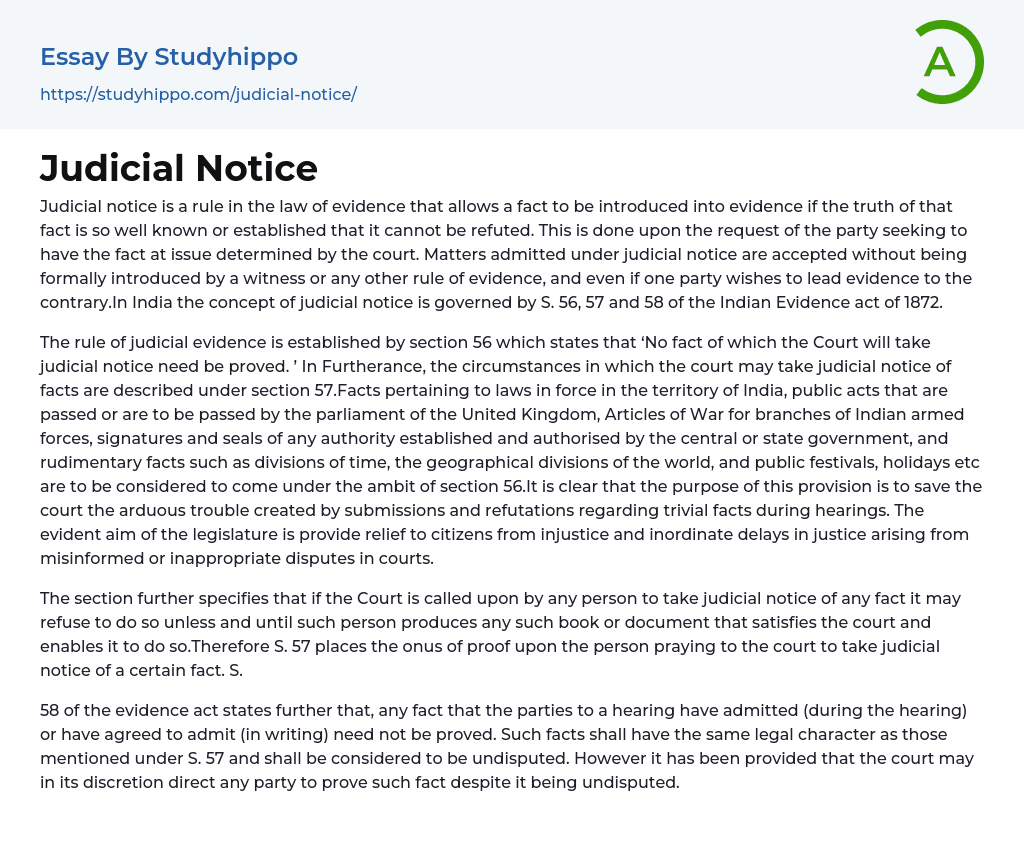Judicial notice is a rule in the law of evidence that allows a fact to be introduced into evidence if the truth of that fact is so well known or established that it cannot be refuted. This is done upon the request of the party seeking to have the fact at issue determined by the court. Matters admitted under judicial notice are accepted without being formally introduced by a witness or any other rule of evidence, and even if one party wishes to lead evidence to the contrary.In India the concept of judicial notice is governed by S. 56, 57 and 58 of the Indian Evidence act of 1872.
The rule of judicial evidence is established by section 56 which states that ‘No fact of which the Court will take judicial notice need be proved. ’ In Furtherance, the circumstances in which the
...court may take judicial notice of facts are described under section 57.Facts pertaining to laws in force in the territory of India, public acts that are passed or are to be passed by the parliament of the United Kingdom, Articles of War for branches of Indian armed forces, signatures and seals of any authority established and authorised by the central or state government, and rudimentary facts such as divisions of time, the geographical divisions of the world, and public festivals, holidays etc are to be considered to come under the ambit of section 56.It is clear that the purpose of this provision is to save the court the arduous trouble created by submissions and refutations regarding trivial facts during hearings. The evident aim of the legislature is provide relief to citizens from
injustice and inordinate delays in justice arising from misinformed or inappropriate disputes in courts.
The section further specifies that if the Court is called upon by any person to take judicial notice of any fact it may refuse to do so unless and until such person produces any such book or document that satisfies the court and enables it to do so.Therefore S. 57 places the onus of proof upon the person praying to the court to take judicial notice of a certain fact. S.
58 of the evidence act states further that, any fact that the parties to a hearing have admitted (during the hearing) or have agreed to admit (in writing) need not be proved. Such facts shall have the same legal character as those mentioned under S. 57 and shall be considered to be undisputed. However it has been provided that the court may in its discretion direct any party to prove such fact despite it being undisputed.
- Supreme Court essays
- Supreme Court Of The United States essays
- Animal Cruelty essays
- Law Enforcement essays
- Juvenile Justice System essays
- Surveillance essays
- Forensic Science essays
- Crime Prevention essays
- Criminal Justice essays
- Criminology essays
- Drug Trafficking essays
- Juvenile Delinquency essays
- Organized Crime essays
- Penology essays
- Prison essays
- Property Crime essays
- Punishment essays
- Serial Killer essays
- Sexual Offence essays
- Victim essays
- Crime scene essays
- Punishments essays
- Charles Manson essays
- Juvenile Crime essays
- Piracy essays
- Stealing essays
- Gang essays
- Hate Crime essays
- Homicide essays
- Damages essays
- Murder essays
- Robbery essays
- Ted Bundy essays
- Prostitution essays
- Violent crime essays
- Rape essays
- Identity Theft essays
- Sexual Harassment essays
- Distracted Driving essays
- Drunk Driving essays
- Detention essays
- Sexual Assault essays
- Sexual Assault on College Campuses essays
- Cyber Crime essays
- White Collar Crime essays
- Fur essays
- Federal Bureau Of Investigation essays
- Fire Department essays
- Criminal Justice System essays
- Commitment essays




